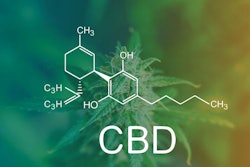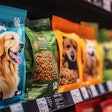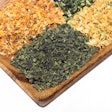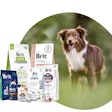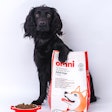
Petco announced it will not sell dog or cat food and treats containing artificial colors, flavors and preservatives by May 2019.
In January 2019, Petco will begin removing dog and cat foods and treats with artificial ingredients, both from store shelves and ecommerce, with a commitment to complete the process by May 2019. Some of the more than 40 artificial ingredients Petco is eliminating include FD&C Red No. 3, butylated hydroxyanisole (BHA), butylated hytroxytoluene (BHT), glycerol tributyrate and benzaldehyde, among others.
Through referencing available guidelines provided by the Association of American Feed Control Officials (AAFCO) and the U.S Food and Drug Administration (FDA), Petco defines artificial colors, flavors and preservatives as:
- Color from artificial sources: any dye, pigment, or other substance that can impart color to a food that is not derived from a natural source.
- Artificial flavor: any substance, the function of which is to impart flavor, which is not derived from a spice, fruit or fruit juice, vegetable or vegetable juice, edible yeast, herb, bark, bud, root, leaf or similar plant material, meat, fish, poultry, eggs, dairy products, or fermentation products.
- Artificial preservative: chemical substances added to or sprayed on the outside of food to retard spoilage, deterioration, discoloration, or contamination by bacteria and other disease organisms. Does not include preservatives that are derivatives of natural compounds.
Petco Pet Wellness Institute founded
As part of this initiative, in 2019 Petco will also launch the Petco Pet Wellness Institute: a coalition of experts from all spectrums of pet health and wellness. Together, veterinarians, nutritionists, pet psychologists, academic researchers, and other credentialed leaders will attempt to ensure Petco is offering the best information, education, and services – not only for nutrition, but for topics and issues affecting pets' overall health and well-being.
Part of the institute's mandate will be funding evidence-based research to help further understand and define industry-wide issues, including the effect of food and ingredients on pet health. While data around pet wellness is currently limited, the institute will help provide clarity and inform Petco's initiatives, ensuring the brand is continuing to meet the demands of modern pet parents.
Survey on pet owners’ view of artificial ingredients
From October 15 to October 20, 2018 Edelman Intelligence fielded a 10-minute online survey that included 1,300 pet parents and 100 veterinarians across the United States, ages 18 and older, according to Petco. The data was weighted to be nationally representative on age, region and race/ethnicity. Pet parents are defined as dog and cat owners who either possess or share primary responsibility for buying products and services for their pets.
According to the survey, 87 percent of pet parents say feeding their pet food made with no artificial flavors, no artificial colors and no artificial preservatives is important to pet's health and well-being, with 59 percent of vets agreeing that pet owners should actively seek out foods without those ingredients. Furthermore, 95 percent of pet parents believe their pet's diet and nutrition is essential to their pet's overall health and wellness, yet more than half (56 percent) say finding healthy products for their pet(s) is confusing, with another 47 percent reporting that finding healthy products for their pet is difficult.
Statements from Petco executives about artificial ingredients in pet food
"Some may question whether this makes good business sense, but putting pets' health first has always been the right thing to do for Petco,” said Petco CEO Ron Coughlin, in a press release.
"In cases where an existing brand is unable to update some or all of their products to meet our criteria by May of 2019, we will not carry either specific products or the brand entirely – and we'll help pet parents affected by such a change to safely transition to a new food or brand that we believe is healthier for their pet,” said Nick Konat, co-chief merchandising officer for Petco.
"Pet parents are seeking answers that help assure them they are making the right choices," said Dr. Whitney Miller, DVM, MBA, Diplomate ACVPM, and Director of Veterinary Medicine at Petco. "We're stepping out ahead of the industry here because we believe it's the right thing to do. With Petco's new nutrition standards, we will only offer food that we believe supports overall pet health and wellness, making the decision process much easier for pet parents."
"As a veterinary nutritionist, I choose pet foods that are free of artificial colors, flavors, and preservatives when feeding my own dog and cats," said Susan Wynn, D.V.M., a board-certified veterinary nutritionist at BluePearl Veterinary Partners, a national provider of specialty and emergency veterinary care based in Atlanta, GA and owned by Mars Petcare. "Consumer opinions have more influence on company practices now than ever before, and market surveys have shown that pet owners are concerned about manufacturing and label transparency. Almost 70 percent of millennials are more likely to research and purchase foods with natural ingredients. I think these well-informed pet owners will be pleased to know that they can count on Petco to stock the brands in which they believe, and I look forward to the rest of the industry following Petco's lead."






